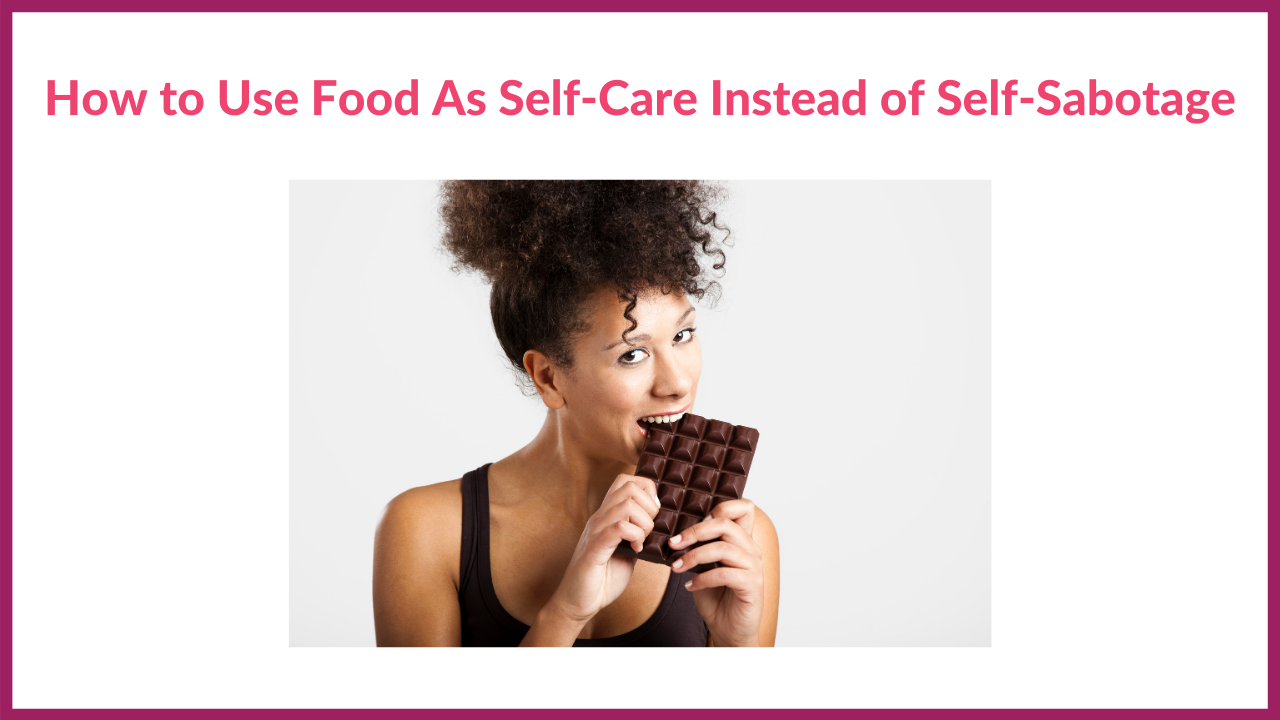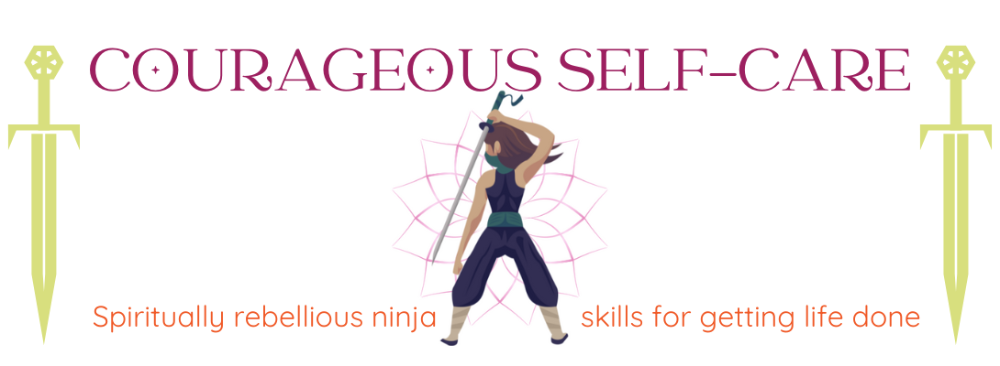How to Use Food As Self-Care Instead of Self-Sabotage
Jan 19, 2021
Last week, we discussed (or really it’s more that I told you… not a whole lot of back and forth going on here) how self-care is NOT selfish. And I vehemently urged you to make sure that you have daily practices in place that are self-caring beyond putting on nice-smelling bergamot lotion and having bubbly lavender baths.
Don’t get me wrong, your skin is important and so is time to yourself amidst the bubbles, if that’s what you like, but you can take all the fizzy sudsy soaks you want and things will pretty much be the same when you get out as when you got in. If only a bath could infuse you with a heightened sense of self worth...
Anyway, this week, I’d like to laser in on the topic of food.
Oh food. Glorious food.
Food can certainly be used for self-care. It can also be used for self-sabotage. And pretty much everything in between.
If you’re anything like me, you may have experienced complexities in your relationship with food.

Here are a few snapshots of my food experiences that will hopefully have you nodding in solidarity, confirming your suspicions that I’m even weirder than you first thought, or possibly even convulsing with chuckles and giggles. Ideally all three at once.
Complex Relationship with Food Experience #1
Towards the end of grade 12, being an exemplary Food Studies student (except for when the assignment was to cook cow tongue - I couldn’t bear it so I quickly dumped the severed tongue in a pot of boiling water with my eyes closed and hoped for the best… uuugghhhh) , I considered becoming a chef.
My other consideration was to become a Phys Ed teacher, and being a 17 year old girl, the sole basis for choosing the PE teacher was so that I wouldn’t get fat. In my mind, chef = fat, PE teacher = not fat. I trust that I made that right decision, but man, I don’t think I could have made the choice for a more superficial reason.
I didn’t go with chefing, but ever since I was little, I’ve been fascinated with nutrition, cooking and eating. Making and eating nourishing food is how I spend a significant amount of my time.
Complex Relationship with Food Experience #2
With all that research about food, I’ve tried many different ways of eating. "Tried" might be a little on the light side. A better description would be that I’ve immersed myself in a multitude of strict regimes, with the discipline of a drill sergeant.
One time, I was following Tim Ferris’ 4 Day Body regime to a T. Basically it meant eating huge quantities of beans and legumes for 6 days a week. Let your mind wander through the implications of that for a few moments...
During this bean-filled regime, my husband and kids and I were driving through BC and needed to stop for lunch.
I suspected that the German Schnitzel house wouldn’t have a lot that I could eat, but we tried it anyway. Zoe and Oakley were super hungry (and so was I because beans aren’t really all that filling). We sat down at a table and I started pouring over the menu to see what I could eat. The answer was NOTHING!
I made my hungry kids and husband get up and leave so we could find somewhere more aligned with my current food rules. They were not impressed, but they followed me out anyways.
We tried another restaurant, more of a pub situation, and I did it AGAIN! We left two restaurants because that inner drill sergeant just had to make sure I was following the rules.
I don’t remember where we did eat, but I know I was in tears over that one, not to mention extremely hungry and frustrated.
Complex Relationship with Food Experience #3
I’ve put a lot of labels on myself when it comes to food. I’ve been vegan, raw, paleo, vegetarian, sugar-free, grain-free, dairy-free, flavour-free, etc. I’ve done fasting, cleansing, 6 meals a day, 3 meals a day, seasonal eating, close-to-starving, overeating and the like.
One time, I did a cleanse that lasted months. MONTHS!!! The book I followed warned that during the first week, I would feel pretty crappy because it was a detoxification. I concurred.
It said that in the second week, I would start to feel a little better. I still felt like it was the first week.
It promised that by the fourth week, I would feel amazing! Energized! Filled with life force! I really still felt like I did in the first week.
By the sixth week, the book said I would never want to go back to sugar or dairy or grains. I disagreed.
Once the cleanse finished around week 8 or 9, I felt so deprived and unhappy that I decided to do my own kind of cleanse. I called it a Cake Cleanse. It meant I could eat cake whenever I wanted.
I started feeling better right away. Go figure.
As you can see, I’ve used food as both self-care and self-sabotage. I’ve spent a good chunk of my life thinking about food, preparing food, researching food and obsessing about food.
Here’s what I’ve learned. There are certain ways of showing up with food that are helpful. There are other ways that are harmful.
Because I finally feel like I’m in a place where my relationship with food is more on the self-care side of things, I’m offering a Self-Care Masterclass to show you how to make good friends with food.
The relationship should be one that fills you up and nourishes you - both because of the foods you’re consuming and the thoughts and feelings you’re having about it.
If you feel like you’re more on the self-sabotage or disciplinary action side of things with food, or you feel like there are a few tweaks you could make to move more into love with food and yourself, I invite you to check out this month’s Self-Care Masterclass:
How to Use Food as Self-Care Instead of Self-Sabotage
In the masterclass, you’ll learn:
>The number one reason your relationship with food is so difficult and how to turn into smooth sailing from here on in
>The fatal eating blunder that I want you to garburate this very second
>Why how you’re eating is just as important as what you’re eating (and it’s not just about turning off the TV or eating more slowly)
>The four invisible ingredients that will forever transform your relationship with food (and doing these four things won’t just help with food, they’ll change your life in ways you can’t possibly imagine)
>The key that most people miss when they’re revolutionizing their eating habits (if you don’t know this key, you’ll probably stay stuck forever… sounds intense, but it’s really a gamechanger)
And more. So much more. I’m so excited to go there with you, if it’s a fit.
I’ve been all over the place with food. It’s taken me years to come into an empowered yet relaxed relationship with it. I’d rather you didn’t have to go through the same thing.
Click this link to explore in more detail what this month’s Self-Care Masterclass will do for you. My vision is for you + food to = happily ever after.
Whether you’re digging the Masterclass or not, here’s what I invite you to do when it comes to your food relationship.
- Get curious about your thoughts about food.
- Notice your feelings about food too, both when you’re eating and when you’re not.
- Reflect on whether you’re using food as self-care (ideally not in the way of a cake cleanse) and when it’s more about self-sabotage.
Nutrition is definitely a form of self-care, and there’s so much more to it than just your food choices. Oh so much more.
I trust that this post will give you some food for thought. I’m sorry. That pun felt absolutely necessary in a super obvious sort of way.
With buffets of love and a smorgasbord full of courage,
Christina

